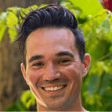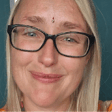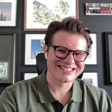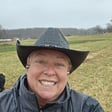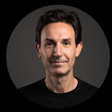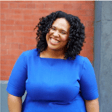Become a Creator today!Start creating today - Share your story with the world!
Start for free
00:00:00
00:00:01

Somatic Sips : Zevia, When It All Bubbles Up
Listen in as Autumn Lucas shares her story with trauma and how it lives in the body, causing severe conditions to heal from in a holistic way. From digestive disruption to muscle tension, sleep issues to chronic pain—your body remembers, even when your mind doesn’t.
We’ll talk about:
- How the nervous system holds onto stress
- The unexpected ways trauma shows up physically
- Practical tools for regulation and release
Plus, Zevia in hand, we share personal reflections, insight, and a few moments of laughter along the way. Because healing is never a flat line.
Transcript
Introduction to 'Something's Brewing' and Guest Autumn Lucas
00:00:00
Speaker
That was my friend's one piece of advice to me before starting a podcast was don't forget to hit record.
00:00:12
Speaker
Hello, everyone. Welcome back to Something's Brewing, the podcast where we stir up real conversation about mental health, well-being, what it means to truly thrive in and out of work. I'm your host, Laura Joseph, and I'm excited for today's episode. So we have Autumn Lucas joining us today. And funny, we just met in Costa Rica, trip doing a docuseries together, and You and hit it off off the bat.
00:00:35
Speaker
We kind of went deep real quick and that was, it was like super fun. But I came to really admire your experience around mental health and well-being and i'm excited to have your voice shared today.
The Zevia Vanilla Cola Conversation
00:00:47
Speaker
So the first thing I always ask is what's in your cup and then I'll have you introduce yourself after that.
00:00:53
Speaker
ah Well, thank you so much, Laura. I'm so glad to be here. I'm honored that you invited me onto your podcast. So thank you. it Today in my cup, I have my tried and true Zevia vanilla cola. I am a huge fan of Zevia. I am in no way sponsored by them or whatever.
00:01:09
Speaker
Just letting y'all know if you want a good sugar-free soda beverage without the sugar crash. Zevia is good. It's sweetened with stevia. i love it It's good stuff. Awesome. Never had it. I'll have to try that. It's really good. They have tons of flavors. If you like fruity, they've got orange cream is one of my faves right now. And that one's caffeine free. Yeah, check them out. They're awesome. Perfect.
Filming the Docuseries: Shared Stories and Vulnerability
00:01:30
Speaker
I will. Well, like I said, we met in Costa Rica on a docuseries meeting a bunch of amazing women sharing their story. And although obviously I wasn't really partaking in the experience of menopause or perimenopause, which is what the series was about.
00:01:44
Speaker
I was there as a partner and supportive person. And you and i did just connect on a deeper level of living through a lot of struggle and how it manifests in the body physically, mentally, spiritually.
00:01:56
Speaker
And just wanted to give you a space to share your story and understand that healing is not a one size fits all. So I think your story is a valuable one, how you healed, continue to heal. It's an ongoing journey, but wanted to give you that space to share and have ah have a dialogue about that today.
00:02:13
Speaker
Yeah, thank you. I really appreciate it. You know, one of the things that really woke me up, one thing I noticed very quickly, and not long after I stepped off the plane in Costa Rica, because of course I went there expecting to film a docuseries about perimenopause and menopause and have it pretty strictly, you know, talking about hormones and all this, which we touched on and learned a lot of great things. But almost immediately getting off the plane, I realized,
00:02:41
Speaker
Oh, wow, this is so much deeper than what I prepared myself for. And it's a good thing because, you know, like you said, we met these people who we've never met before face to face and we're just thrown into the intense atmosphere that is filming. But on top of that, we get to know each other very quickly on a very deep level.
00:03:01
Speaker
And what I came to learn about you, about Carrie, all the beautiful women and and people that were part of that journey is we all had a story. And it didn't start with perimenopause or menopause. It started way before that, right? and And what each of us lived through in our life experiences that led up to that moment of meeting each other with that commonality that was perimenopause and menopause and how it affects ah women and men alike. But just ah realizing it's just so much deeper than that, right?
00:03:31
Speaker
So much deeper. And it's interesting that you felt that right off the bat. What did that kind of do to you? Because I feel like it was kind of ah a wake up call where, shoot, I might have to like, be vulnerable here. And what did that mean to you?
00:03:43
Speaker
So that that's really the vulnerability is probably one of the first things I recognized. And I, of course, signed on to that series specifically knowing, hey, I know I have a story to share. I know that there will be people out there that will benefit from what I have to share.
00:03:59
Speaker
And I knew it was more than just the biology of it. I knew that there was something about my story that would resonate with people and help them. So for me, when I sat down and started giving that first interview, that's when it just hit me all at once. it was actually quite
Autumn's Health Journey and Western Medicine Critique
00:04:12
Speaker
emotional. They had to do a retake two or three times with me on that first interview that I'm sure you remember so fondly as well, because I think they grabbed you right off the plane to basically get the door and they're like, all right, go.
00:04:25
Speaker
That's kind of how it was for me. Right. But I realized very quickly, okay, this has a lot more to do. with ah the the deeper goings on in my life than just, hey, I'm having hot flashes and perimenopausal.
00:04:40
Speaker
So it hit me like a freight train and was like, wow, okay. So we're going to have to dig deep and take things apart, piece them back together in such a way that that does tell this story in an effective way that people can relate to. So that's kind of where I jumped in and um was really proud of myself because I was able to open up quite a bit. And for me, that's hard when you come from a long history of trauma and trauma responses and learning that, you know, for me specifically stonewalling and um just being very hypervigilant and in fight or flight constantly. It is so hard to let people in.
00:05:15
Speaker
It's so hard to let people in. Honestly, it didn't feel like it was that hard for you, which is great. I mean, you were put in a place with strangers. I recognized that very quickly and was like, okay, it's time to pull myself out of my shell.
00:05:28
Speaker
And it's funny you say that you didn't feel like it was very hard for me or didn't perceive it that way. But for me on the inside, i have this internal dialogue as part of my anxiety and such that I am constantly four steps ahead of what's going on and analyzing like, what should I do? What should I say? Oh my God. Like that's just how my brain works. And it's exhausting. tiring. Yeah.
00:05:51
Speaker
ah So, but yeah, it's it's easier for me to get in smaller group settings like this or with just a couple of people and just kind of share our stories and stuff. And that's when i can kind of settle down and just kind of get real with people more naturally anyway. Yeah.
00:06:06
Speaker
I mean, I think getting real is what resonates with people and people feel the authenticity. So when you say your story, what would you necessarily say is like autumn story? Yeah. So I've got a really long story, um you know, and don't we all right. We all have we all do.
00:06:22
Speaker
stories and backgrounds and such. But for me specifically, the common trend has been that I've been struggling with some kind of either health or physical health or mental health issue or issues and trying to navigate Western medicine versus more homeopathic approaches or like, what can I do to correct these issues?
00:06:46
Speaker
And I've always been a person that has constantly searched the why. i have never, ever sat comfortably with someone just saying, well, this is what you have and you need to take this medicine.
00:06:58
Speaker
Goodbye. And this is why we connected so deeply. yeah So I can remember as early as my earlier childhood years, you know, when you're a kiddo, I think I was probably around four to eight years old when I started to recognize something in my heart and my brain and ah like about my conscience, about my soul, about what's going on up here.
00:07:20
Speaker
Something just feels exhausting. I don't know how else to put it. I just didn't feel right. And I didn't know how to articulate that as a child. Right. So I can remember just going up to my parents as young as five saying,
00:07:32
Speaker
I just feel weird, like something just I just feel weird. And they could never really get out of me what that meant, because I didn't know what it meant as a five year old. What I know now is that feeling weird was the growing and pent up trauma, anxiety, depression, like all those aspects that were part of the environment that I was raised in.
00:07:54
Speaker
And as a child, you don't necessarily recognize that the chaotic and traumatic environment that you're existing within is anything but normal. Right.
00:08:05
Speaker
So, ah you know, i had these conflicting feelings where I'm sure now looking back, I was just suffering from severe anxiety and depression and PTSD, but I didn't know how to articulate that.
00:08:18
Speaker
So I didn't know what to do with it besides
Mental Health's Impact on Physical Health
00:08:20
Speaker
tell my parents I feel weird. Well, then, you know, they take you to the doctor and the doctor's like, well, what feels weird? And then you're like, well, I mean, i my tummy hurts. And they're like, oh, okay. Well, you know, you just have IBS or whatever.
00:08:31
Speaker
um They never... At five years old. Yeah, like it never really... probed further than that until I started to get older. And as I started to get older, I started to notice some very real identifiable, oh, okay, I'm having chronic diarrhea now and I am having GI pain 24 seven and severe bloating.
00:08:53
Speaker
So from there, it became a little easier to at least vocalize what was going on with my body, with my doctors. But there again, the why was never there. Nobody ever really...
00:09:03
Speaker
questioned, well, what could be causing all these symptoms with you outside of just basically running blood work or lab tests. um So it's been a journey for me. It's been a really long one. And just in the last year leading up to our show in Costa Rica is when I really started to get answers to the whys.
00:09:23
Speaker
And that's satisfying. And I'm not done. know you smiled so big when you said that. And i love it because I can feel that having lived or living it with you personally too, where you know, we shared in Costa Rica, it was like within the last two years, it's diagnosis of ulcerative colitis. And like, only growing up was just depression, anxiety, OCD for me. And no one ever asked holistically what else I was feeling. It was just here's a medication to have those feelings subside.
00:09:49
Speaker
And off you go. And then things got worse and worse. And then, you know, catalyst hits. And it's like, how the hell did this happen? And most people will just continue to take medicine. And you've talked about your fair share of meds that you're on and taking. And but many people just take those and never question why. And it's usually stemming all the way back, like you said, to childhood.
00:10:10
Speaker
But those things are sometimes so hard. One, never discussed into very hard to return to. not knowing that they're actually the solution to a lot of things that are just manifesting in the body. Yeah, definitely. And I think it's unfortunate. I understand just the way we our system is set up here in the States specifically. um It is very much a business, right? It is a business transaction. and When you walk into that doctor's office and that doctor has a set scheduled amount of time to field your complaint, throw a diagnosis on it give you a medication because that's all they're trained to do.
00:10:45
Speaker
and then send you out the door. They are not trained or ready or prepared to dive into or investigate wise with you. And I feel like that's where i don't really know what the perfect answer is because we're just two people. Right.
00:10:58
Speaker
Right. But I think a good place to start is having these types of conversations that you and I are having right now to encourage other people out there. Not to necessarily question or blow off your doctor. Your doctors have good education, good knowledge. They are very competent in the field that they studied in, but that's where it ends.
00:11:18
Speaker
So do you stop your investigating of what's going on with your body there? Does the answer for you end with, here's the prescription, I'm going to take it for the rest of my life or until it fails me?
00:11:28
Speaker
or to some people, I think it does though, like yeah honestly, and that's okay if you're one of those people, but first for others like you and I, It doesn't for whatever reason that we know that, hey, I never saw myself as the sick person.
00:11:42
Speaker
What the heck is happening? For me specifically, i found myself after years of just all these new symptoms popping up here and there, and it got to the point where it became severely disruptive to my daily life. um I ended up having to walk away from 16 years of practicing dentistry because of my symptoms.
00:12:02
Speaker
It affected my marriage. It affected my, you know, relationship with my children, my ability to travel and even really exist in a normal fashion. um So for me, that's what spurred the I need to find this way. And here's another thing, you know.
00:12:17
Speaker
If you don't really evaluate your why, like what is going on, what else is is's going on in your body, it's hard to get ahead of it So for someone like me, for example, I went largely close to 40 years with significantly, number one, undiagnosed, but number two, unprocessed and undealt with trauma that I just didn't deal with.
00:12:38
Speaker
And that's very common, especially in women and especially in moms, I find because We, you know, especially me as ah as a young mother, I became a mother ands at 20 years old and I was a single mom.
00:12:50
Speaker
I didn't have time to worry about me. i was worrying about my children. is So what happened was i would have a tummy ache, go to the doctor and deal with the diarrhea. OK, here's this medicine. Try this out.
00:13:02
Speaker
Well, what I ended up ignoring was
Autumn's Transformation and Treatment Journey
00:13:05
Speaker
the how and important it is to actually deal with the trauma, process it and start looking into other approaches that could open up that door instead of just continuing to shove the trauma down and not deal with it. Because what happens there that throws your nervous system off, which, you know, our brain and gut is all connected. You know, and then you end up someone like me that is a very healthy person. I'm very active. i eat super clean. i take care of my body.
00:13:34
Speaker
ah But I completely ignored my mental health. And what happened? I accumulated a whole bunch of autoimmune diseases and new physical ailments because i allowed my brain to stay sick.
00:13:49
Speaker
That makes sense. It makes total sense. so Exactly what happened to me. And, you know, it popped up for me in middle school, got worse in high school, even worse in college. And I, to this day, would not say i feel like I have selective memory of when gut issues actually started to happen.
00:14:05
Speaker
There was such a significant drop in my mental health, like the worst it's ever been when my gut issues started. That my background in nutrition and health, I don't know if that's what caused me to really look into it.
00:14:18
Speaker
But I had to be my own advocate. I had to research everything on my own. I had to like trust that there was some connection there. And then thankfully was validated by some holistic practitioners out there. But It's not a, again, to your point, like there's different modalities, but there's solving it from a physical issue is not the solve, right? It has to be dealt with on a spiritual, emotional, physical, all those levels for a comprehensive holistic approach.
00:14:45
Speaker
ah And that's my um my ultimate mission. thing know, what I do for a living. i do I work in the ketogenic and carnivore health space full time for a living. And I am very passionate about that lifestyle. And I think it does a lot of good for a lot of people.
00:15:00
Speaker
However, I feel like if we don't pay attention to, like you said, this whole umbrella, right? We have to kind of pay attention to the entire body and be willing to be open to different interpretations and different possibilities and different modalities, like you said, to heal a whole person, right? I can prescribe a meal plan for someone and say, okay this is all you need to do. You need to quit dairy. You need to quit gluten. Stop eating ultra processed foods. You'll be fine.
00:15:28
Speaker
Like, Will it help some? course it will. have lower inflammation and, you know, probably get them in a better metabolic state. But it's completely ignoring the mind, right? It's hardest thing to change, though. It's so hard.
00:15:43
Speaker
It's so hard. And it's something that we've just trained to ignore. I mean, I learned... from a tragically young age, and everybody has different backgrounds and different experiences, but I learned at a very, very, very young age that what was safe for me was to not complain and to not ask questions and to just do what I'm told.
00:16:02
Speaker
So then, you know, go years with just not complaining, not saying anything, just doing what I'm told. And, you know, you get to be ultimately at 35 years old, believe 34 or 35 is I really decided to
00:16:17
Speaker
okay, I'm going to take this into my own hands because I had spent 35 years being quiet, sucking it up, doing what I'm told. And where did rest the suppress suppress it get me so debilitated that I was dependent on alcohol. So I was abusing alcohol. I was just self-soothing with junk food, got ballooned up to almost 200 pounds.
00:16:39
Speaker
out of just eating crap and drinking too much and being depressed. So depressed. I had, i had some really serious mental health problems. it was bad. it was scary. And I, I'll never forget the day I was laying on the sofa, just curled up in the fetal position in this ball. Now keep in mind, I was on tons of prescription medications for my colitis at the time.
00:16:59
Speaker
Hadn't, Fairly recently at that point found out I had celiac disease as well. And i was like, this is just this is no life to live. I'm not showing
Self-Advocacy in Health and Holistic Healing
00:17:08
Speaker
up for my kids. I'm not showing up for myself. I'm basically just mustering what I can to force myself to show up at work, take really good care of my patients and then go home and curl up in this fetal position on the sofa.
00:17:21
Speaker
And because i wasn't addressing all the other issues going on in my life, i was just taking a pill. course, that wasn't helping anything. It was making me more depressed, which would make me drink. But what does the alcohol do?
00:17:32
Speaker
makes you even more depressed and inflames your body even more. And so it's just I found myself in this cycle that was really, really alarming. And that's when I decided ah December 2018 is the day,
00:17:42
Speaker
the way I was going to ask you, what was the trigger? was like, this is bullshit. I don't know. Sorry. But I don't know what else to say. i was like, I need to change something and it needs to be big. And if I don't do it, I'm not going to be alive in five years. And my children are going to have to navigate this world without me.
00:18:01
Speaker
And I knew it. So since that day, I think we're what, six and a half years now into not only, you know, completely overhauling my diet, which I did successfully, lost 70 pounds successfully, and have kept it off. And that's great. Really, just in the last year or two, have I really had to slow down and question, okay,
00:18:21
Speaker
I've got a GI doctor that is telling me that I am a complete enigma and he's ran out of options for me. And I'm currently on one experimental medication for my condition. And and when it fails, there's no if, when it fails, he's going to send me to Mayo Clinic because he doesn't know what else to do with me. And I'm like, something's causing this. And it's not my diet because my diet's already good.
00:18:43
Speaker
It's not my lifestyle. What is it? And then about a year ago, I figured out what it was. I had to sit down and admit, oh, I'm severely mentally ill.
00:18:54
Speaker
I have severe chronic post-traumatic stress disorder. I'm not dealing with my anxiety and depression. I'm stuffing it down and I'm just moving on. And what happened? The brain can only stay inflamed and dysregulated for so long before your body starts to break down around it.
00:19:08
Speaker
And that was best piece. that my GI doctor literally has never, ever asked about, like at all. I had to figure it out for myself.
00:19:20
Speaker
um So from there, yeah, I've just been, you know, navigating it. And finally, i sent myself to mental health hospital, I self committed, was like, Hey, I need help. This is really bad. and And um after a year, over a year now of intense of therapy, and really digging into myself and doing the work a lot of different ah techniques and tools that we use to to manage PTSD and my mental health and everything. I feel like I'm in a good place now to now that I've figured out the mental part of it ah continue doing that work. Because, of course, just because, you know, it's a lifelong thing.
00:19:57
Speaker
It is, right? like Just because you have some success. And like for me, you know, I had a graduation certificate from my mental health hospital. It was a big deal. Just because you graduate or they tell you, okay, you're fine now. You don't have to come in, you know, and check in with us five days a week.
00:20:12
Speaker
That doesn't mean the work stops, right? So for the last year, that's what I've really been focusing in on is, okay, well, this is for me where the work really begins, because now I have the tools necessary to deal with my mental health.
00:20:25
Speaker
So I need to keep working on that. Well, now I continue to dig deep and figure out what else could I be doing to help heal my body? And
Mental Health Practices and Personal Boundaries
00:20:32
Speaker
that's kind of where I am right now with not only my, you know, my low hormones, my perimenopause symptoms, but my GI issues specifically as the main thing I'm dealing with now, or just continuing on with the GI issues and just figuring out what else I can do to heal my body while I continue to be very, very aware of the fact that my mental health is very important too. So.
00:20:57
Speaker
Thank you for sharing that. And as you're talking, I was thinking of this, what would you say mental health looks like to you personally? And what are those tools that you keep like on the day to day? What does it look like for you?
00:21:09
Speaker
um ah I think the most important thing for me is just recognizing that at the end of the day, I am literally the only person that's going to show up for me and is wholly responsible for my reactions to everything.
00:21:24
Speaker
any event or action that happens around me or even to me. So that's been really empowering is digging in and recognizing the fact that ultimately, even though all these terrible things could be happening around us and do happen around us and happen to us, I can approach it in a couple of ways. I can continue to stuff it down and ignore it and pretend like it's not a problem and end up back in the mental hospital.
00:21:48
Speaker
Because that's what would happen. Or i can reach for my tools, dig deep and take care of myself because nobody's going to come rescue me. I have to do it myself. So for me, what that looks like is i am a huge geek for journaling. i know a lot of people think it's corny, but I love it.
00:22:05
Speaker
powerful and it's very important so keeping a journal and just writing those thoughts down whatever they could be they could look like word salad at the time but get it out get it on paper speaking up for myself has been very difficult and um that's something that you and i talked about a lot say that came up for us in costa rica you actually reminded me that i had that power at one point and i'm very grateful im so happy to hear that i didn't know i had that influence but it seemed like such a hard thing for you that I was like, it naturally was just like, nope, you got a voice. it's it's ah very It's one of the main issues with a lot of people that have a lot of trauma, especially with a complex post-traumatic stress disorder diagnosis is we learn to just be people pleasers and not question and not speak up because it's just easier and safer to do that.
00:22:55
Speaker
But again, where did that get me? you know I'm about to turn 42 years old now. And up until a year or two ago, I really was just like, okay, I'll just do whatever you say. And that's fine. And I don't think that it certainly doesn't work for me, it might work for some people. But um no, it's, it's a good recipe for disaster. I think when you just ignore your own intuition and your own um ability to speak up for yourself in question.
00:23:19
Speaker
um it's It's really unfortunate that people struggle with that. So Yep. It's been a big part of my my healing journey and getting so close to feeling like not only mentally am I in probably the best place I've ever been in my entire life being literally born into trauma. It's hard to completely break away from that cycle, but I feel like I'm there.
00:23:38
Speaker
um And now I can just really focus on my my physical health. Right. And what you're also doing. Yeah, which I'm also doing. You're also doing that. um Just kind of tweaking my diet a little bit.
00:23:50
Speaker
Very much like with anything, I think not only do our physical needs and our emotional needs change over time, so our dietary needs change over time.
00:24:01
Speaker
And that's all really important to look at and evaluate as well. So yeah, that's what I'm kind of in the process of doing right now. Just tweaking my diet a little bit, working on some different supplements to see what we can do there to heal some things specifically with my IBD, which is pretty, it's been an an exhausting, you know.
00:24:19
Speaker
40 years. Specifically with the IBD, I wasn't diagnosed until my early 20s, but my symptoms started when I was 15 or 16 years old. That's wild. That's like me with an OCD. It took me 10 years to be diagnosed with OCD, and it takes far too long for people to be diagnosed with Disorder, but it goes back to what we talked about with doctors just being acute treatment and putting a medicine behind it. And I would say you and I being a little bit more educated in the health field could help in terms of just what resources and advocacy we could have for ourselves. But majority of people don't know what questions to ask or even to question it. Right.
00:24:54
Speaker
So that's a hard thing. But you mentioned journaling. I wanted to see if there was anything else that came up for you in terms of like mental health toolkit. Yeah. So journaling is definitely probably priority. Number one for me. Number two is just showing up for myself every day and allowing myself the space to just be for a certain period of time.
00:25:13
Speaker
how long does that look? Some people are very strict, like, okay, I've got 20 minutes and I do 20 minutes of meditation in the morning and that's what I do. I'm much more flexible in that. And that my only must do is at a certain time, it's usually eight o'clock at
Identity Beyond Roles and the Role of Meditation
00:25:27
Speaker
night.
00:25:27
Speaker
Sometimes I have to let it go a little longer because I'm a mom, but, um, at eight o'clock at night, that's when I clock out. It is when I no longer work against my will.
00:25:38
Speaker
don't know, I shouldn't say it like that, but I'm like, I have the power to ignore these emails until the morning. So I give myself that position at eight o'clock. I put on something comfortable to wear and I get in my comfy space, which for me is my bed.
00:25:53
Speaker
Does that mean I go to sleep at eight o'clock at night? Absolutely not. I just allow myself that space that at eight o'clock at night. Do not ask mom. for anything else. ah You can come and tell me good night, but don't ask me to solve your problems.
00:26:07
Speaker
Don't ask me to come rescue you. unless it's very urgent and needed, which of course is a mom of young adults that does happen sometimes. But yeah, that was really big for me because up until my mental health break, my actual like big time mental health breakdown that I experienced about a year and a half ago, i would never say no.
00:26:26
Speaker
And I never, ever, ever gave myself that space to just be until I got institutionalized and and realized, whoa, I am giving way too much of myself and I'm not allowing myself space to just be.
00:26:38
Speaker
So that is something that's really important to me. It was really hard for me to be in Costa Rica and be um just active and going until like 10 or 11 o'clock at night. every You know what came up for me as you were talking, though? You were very intentional with times that you needed to go back to the room or that you like in the morning.
00:26:55
Speaker
For me, I think I knew too, like morning time is my time, right? So I need to carve out that time. And we were just like, nope, we're ready to go back. I don't really want to hang out anymore. I just need my time and my space. And it's important to have those routines come over. And that was you caring for yourself. And I noticed that. So I just wanted to point that out because yeah it is a big thing. And to have somebody who's gone far too many years completely living for other people and not yourself, you can only imagine how much that would weigh on somebody's mind and give you almost, I don't want to put words in your mouth, but almost no sense of self, right? You're living for other people.
00:27:32
Speaker
And so but lee that was a big one. Didn't take long for my therapist when I was really dealing with my mental health to point that out. They were like, who are you? who Who are you? And I was like,
00:27:45
Speaker
shit, I don't know. i don't know who I am outside of ah mom and an employee. and at the time- That's hard question for me. I was a spouse, but like they're like, but but who are you?
00:27:59
Speaker
and i was like- Funny story. I was talking to Carrie last night and I was like, I switch therapists way too quickly. i like give up on them. And then I'm like, well, you're not helping me. And she's like, nope, I think you gave up on the last one because he challenged you the most. And he was the one that said,
00:28:14
Speaker
you just told me your entire narrative without any emotion behind it, but I still have no idea who you are. And he's one I like was like, bye bye. don't need you anymore. i don't really know what we're doing together. and she's like, I challenge you to go back to that because when you get challenged, that's what you need.
00:28:29
Speaker
So it's so interesting where I find it hard to turn inward because that means I have to look at myself and I have to find that sense of self, which to me feels like the hardest. Like I will spend time at the gym fixing my body. I will spend time nutrition wise. I will try to move away from home.
00:28:47
Speaker
But for me, the hardest thing has been choosing myself to say, I'm going to sit with these emotions and trust that I can work through them. And, you know, so- I'm forced to get back on the meditation, take walks and slow down and really take care of my body and in ways that I haven't. But also journaling was a huge thing for me.
00:29:05
Speaker
And honestly, being more open with people and like not hiding things and trusting that the right people are going to be in my life and not judge me for anything that I bring up to them. I think a lot of people struggle with that too. So I think especially that that's really great that at your age, especially that you've recognized that because so many people will literally go their entire lives without allowing them their space to to speak for themselves and look inward and and explore that. And it's sad.
00:29:35
Speaker
It's really sad. not easy to do. i mean, we spend our whole lives running. You add alcohol, you add other things that people choose. And I think it takes a lot of self-awareness to pause and say, why am I doing this? The why is the biggest question, but...
00:29:48
Speaker
That's a hard thing for a lot of people. And it's a passion area of mine where everybody could just be so much happier in their lives. If we took that 8pm time and said, it's me time or a morning time for 20 minutes and pause.
00:30:02
Speaker
right And it's, it's telling, you know, one of the exercises, one of my therapist gave me which I do. Still, that's is another tool I've carried. And it was really hard is she said, okay, so for five, it might've been five minutes. I don't remember now how long it was, but for five minutes, let's say you're going to close your eyes.
00:30:21
Speaker
You are not going to listen to anything. You are not going to be looking at anything. You're not going to be reading anything. i just want you to be just sit for five minutes in your thoughts. Oh my God.
00:30:33
Speaker
That was hard because we're so used to just doing like for me, especially in part of my trauma and in dealing with, you know, the kind of upbringing I dealt with. I was born into chaos. So I'm very uncomfortable and quiet.
00:30:48
Speaker
If there's not chaos and there's not a lot going on, I literally don't freaking know what to do. So that was a challenge. Safe is hard. Safe is hard, right? Our bodies just conditioned for chaos, for sure.
00:30:59
Speaker
felt like, I felt like, I'm wasting time. what am I doing? Like weird. And I literally, it's so funny. It probably took me months to actually genuinely complete that exercise where I, yeah, but kudos to you for staying with it because honestly I've tried and I have, you know what? You just inspired me to, I'm going to do it tomorrow and I'm going I'll let you know.
00:31:22
Speaker
I will use you as an accountability partner and just say, i did five minutes. I did meditate today, but I did guided. So let me do silence ah tomorrow. It's a hard one. And like I said, it took me months to get there. But it's a powerful one because we let the mind control so much and the mind is just doing what it's supposed to do. And we have the control over it.
00:31:44
Speaker
And I think that's where I've become so reactive and just on all the time that yeah pausing is hard. so it is. we're not comfortable with ourselves at the end of the day. So, yeah and society makes it very difficult for us to even achieve that, especially in the, in this digital age that we live in of constant fast consumption, right?
00:32:06
Speaker
ah Average scroll, like hook time for, you know, they're like, Oh, you got to catch their attention in three seconds. or they're going to scroll right on. And that's what people are looking for. It's just like this constant stream of stimulation and and consumption. Dopamine hits that everybody needs.
00:32:21
Speaker
Yes. It's just like we've all become dopamine junkies. and and And I know why. It makes total sense. but um Yeah, but if you think about it, pausing requires you to sit with yourself. And a lot of people, sorry to tell whoever's listening,
00:32:36
Speaker
If you struggle with this, I guarantee there's a part of you that's scared of yourself. I am, I can definitely say that. And I've talked to a lot of people that are and until we get comfortable with self, we're going to struggle with a lot of the other things. So yeah
Openness in the Workplace and Personal Growth
00:32:49
Speaker
one of the things I did want to ask you before I know, you know, we could talk forever about this and we'll wrap up in a minute, but working in general and, you know, coaching people or whatever it is, having to show up every day, even if I'm in a negative space or a bad place or whatever, and just having so much taboo and stigma around admitting struggle and thinking that you're going to be judged or whatever. So I didn't know if there was any thoughts you had around your experience in the workforce understanding of mental health or what we can do to kind of shift that understanding.
00:33:20
Speaker
Yeah. So I think the number one most important thing that you can do is be aware of your surroundings, make sure that you can trust the people that you are talking to and sharing this information with.
00:33:33
Speaker
But just being honest with yourself and expressing anything that you're feeling or your needs with whether it's your boss or mentor or your coworker, whatever that person is, is just speaking up for yourself.
00:33:46
Speaker
One thing, and i'm not i'm I'm not afraid to admit this, my bosses know this now, but when I had my mental health breakdown a year and a half ago, I didn't tell them I was struggling. I tried to hide it.
00:33:57
Speaker
And because I was so dysregulated and just so sick at the time, tricked myself into thinking I was hiding it really well. Like, oh they don't know what's going on.
00:34:08
Speaker
But one day my boss called me and she just said, Autumn, what's going on with you? Because something's going on. Like you can talk to me. And that was the first time in my professional life that I have had a boss that allowed me permission to let them know, hey, I'm struggling, right?
00:34:29
Speaker
And i there's nothing I can do to go back and fix it now. Like, I can't regret what's already happened in the past, but man, I made it so much harder on myself trying to hide it and not address the fact that I was struggling when all I had to do was pick up the phone and say, hey I'm having a hard time right now. Do you have a minute? Just trusting that you can express that you're struggling, I think is so important.
00:34:56
Speaker
Don't bottle it in. It's not going to get processed or fixed if you don't talk about it. um And obviously, you know, in the workforce and in the professional world, there's appropriate ways and inappropriate ways to express your feelings and how deeply you want to go into it. And, you know,
00:35:12
Speaker
You can save all the dirty details and the specifics for yourself, but just to say, hey hey, I need a minute. I'm struggling here. And allowing that is so important and will help not only you, but also help your bosses or the people that you work with understand what's going on with you.
00:35:30
Speaker
Because Thanksgiving is interpreted a lot too for years. And but you had somebody who trusted and saw you as a person. yeah' Like, hey, this person's not picking up their end of the like, performance. And and we gotta let them go versus like, let me sit down with you and and ask. And I love that.
00:35:47
Speaker
And my 16 years in dentistry, I was never once treated like a human being in that way. i don't feel like like if someone didn't like something I was do, I just got reprimanded for it. Not that I you know was going rogue in the dental office by any stretch, but nobody ever stopped to say, hey, girl, are you are you OK?
00:36:05
Speaker
because i wasn't, I wasn't okay at all. Anyway, so it's really important. Speak up for yourself. You never know your boss more than likely is going to be a good human being and go be like, Hey, what can we do to help you? and I was lucky enough in my situation that that's exactly what happened. So
Final Advice: Trusting the Journey and Maintaining Well-being
00:36:19
Speaker
it's been a really, really good year and a half for me and learning work life boundaries, honoring my mental health, taking care of my physical health and continuing to go down that path of of discovery of What can I do to heal my body as much as that I can um using all these different tools and looking at all the different modalities so at the same time? So, yeah, I'm finally there. Took 42 years. I love it. You are there. And I appreciate so much you joining me on the podcast and the conversation. If there's one thing, one piece of advice you have for people, what would it be?
00:36:51
Speaker
Um, my one piece of advice would ah definitely be sit with yourself, um, allow yourself to feel and reassure yourself every single day that it's going to be okay. It might be messy right now and it might seem completely hopeless and whatever you're struggling with, because we all have stuff that we're dealing with.
00:37:10
Speaker
Trust that there is a way. for you to navigate through that in a way that's going to ultimately lead to a positive outcome. And what you take from that is is yours.
00:37:22
Speaker
But yeah, I have faith that everything's gonna be okay one way or another. And a lot of it has to do with how I perceive it and how I allow it to look in my own life. So yeah, yay for positivity. Yay for positivity. I love that. Thank you so much for being on the show with me and sharing your story and insights. I really appreciate it.
00:37:41
Speaker
Of course. Thank you so much, Laura. was a pleasure. Let's do it again sometime.
